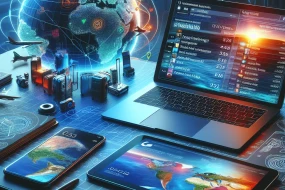
In today's fast-paced world, the hospitality industry is constantly innovating to meet the expectations of tech-savvy travelers. The check-in process, once a cumbersome and time-consuming task, is now being transformed by technology into a seamless experience. This article explores how hotels can leverage technology to enhance guest satisfaction and streamline operations, ensuring a smooth check-in experience while maintaining a personal touch.
The Evolution of Hotel Check-ins
Remember the days when checking into a hotel meant standing in line, filling out forms, and waiting for a room key? Those days are becoming a distant memory as technology reshapes the hospitality landscape. The evolution of hotel check-ins has been driven by the desire to eliminate friction points in the guest experience. From mobile check-ins to biometric authentication, technology offers a myriad of solutions to make the process faster and more efficient. But what does this mean for hotels and their guests? Let's dive into the specifics.
Mobile Check-ins: Convenience at Your Fingertips
Mobile check-ins are perhaps the most significant innovation in the hotel industry in recent years. By allowing guests to check in via their smartphones, hotels can reduce wait times and enhance the guest experience. Imagine arriving at your hotel and bypassing the front desk entirely. With a few taps on your phone, you can confirm your arrival, choose your room, and even receive a digital key. This not only saves time but also adds a layer of convenience that modern travelers crave.
1) Guest Satisfaction: Mobile check-ins provide a sense of control and autonomy for guests, leading to higher satisfaction rates.
2) Operational Efficiency: Hotels can allocate staff to more critical tasks, rather than having them manage check-ins.
Common Mistake: Over-reliance on mobile check-ins can alienate less tech-savvy guests. Offering a balance between traditional and tech-savvy options is key.
Biometric Authentication: A New Era of Security
Security is paramount in the hospitality industry, and biometric authentication offers a cutting-edge solution. By using facial recognition or fingerprint scanning, hotels can ensure that only authorized individuals gain access to rooms and facilities. This technology not only enhances security but also speeds up the check-in process, as guests can be identified quickly and accurately.
1) Enhanced Security: Biometric data is unique to each individual, making it a reliable form of identification.
2) Streamlined Process: With biometric authentication, guests can skip traditional ID checks and head straight to their rooms.
Common Mistake: Privacy concerns are a significant hurdle. Hotels must ensure that biometric data is stored securely and that guests are informed about how their data will be used.
Self-Service Kiosks: The Future of Front Desks
Self-service kiosks are becoming a staple in modern hotels, offering guests the ability to check in, select their rooms, and obtain key cards without human interaction. These kiosks can be strategically placed in hotel lobbies, allowing guests to complete the check-in process at their own pace.
1) Reduced Wait Times: Kiosks can handle multiple check-ins simultaneously, reducing congestion at the front desk.
2) Personalization: Guests can customize their stay by selecting room preferences and additional services.
Common Mistake: Overreliance on kiosks can lead to a lack of personal interaction, which some guests may find off-putting. Ensuring staff are available to assist can help mitigate this issue.
Integrating AI and Chatbots for Personalized Service
Artificial Intelligence (AI) and chatbots are revolutionizing guest interactions by providing personalized service and real-time assistance. From answering queries to managing bookings, AI-powered systems can handle a variety of tasks, freeing up staff to focus on more complex issues.
1) 24/7 Availability: Chatbots can assist guests at any time, offering support even when staff are unavailable.
2) Personalized Recommendations: AI can analyze guest data to offer tailored suggestions, enhancing the overall experience.
Common Mistake: Relying solely on AI can lead to a lack of human touch. It's crucial to find a balance between automation and personal interaction.
The Role of IoT in Enhancing Guest Experience
The Internet of Things (IoT) is making waves in the hotel industry by connecting devices and systems to provide a cohesive guest experience. From smart thermostats to voice-activated room controls, IoT technology allows guests to tailor their environment to their preferences.
1) Energy Efficiency: Smart devices can optimize energy usage, reducing costs for hotels and their guests.
2) Enhanced Comfort: Guests can control room settings with their voice or smartphone, creating a personalized environment.
Common Mistake: Overcomplicating room controls can frustrate guests. Ensuring that IoT systems are user-friendly is essential for a positive experience.
Addressing Common Challenges and Concerns
While the benefits of leveraging technology in hotel check-ins are clear, it's not without its challenges. Privacy concerns, technical glitches, and the digital divide are all issues that hotels must address to ensure a smooth transition.
1) Privacy Concerns: Hotels must be transparent about data collection and usage, ensuring guests feel secure.
2) Technical Glitches: Regular maintenance and updates are necessary to prevent system failures that could disrupt operations.
3) Digital Divide: Offering alternatives for less tech-savvy guests ensures inclusivity and satisfaction for all.
Conclusion: Striking the Right Balance
Technology offers immense potential to transform the hotel check-in experience, making it faster, more convenient, and secure. However, the key to successful implementation lies in striking the right balance between technology and personal interaction. By offering a variety of check-in options and addressing common concerns, hotels can enhance guest satisfaction and streamline operations. As the hospitality industry continues to evolve, those who embrace technology while maintaining a personal touch will undoubtedly lead the way.





























